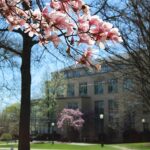
Wooster commemorates Juneteenth with inaugural lecture

The College of Wooster celebrated the inaugural Presidential Equity & Excellence Lecture Series on Thursday, June 16, with a Juneteenth commemorative lecture by Beatrice Adams, assistant professor of history. President Sarah R. Bolton, who in her opening remarks and introduction of Adams acknowledged that this event likely marks her last public address as president of the College, spoke about the purpose and value of the series designed to engage the broader community.
“The new Presidential Equity and Excellence Lecture Series has that name because it reflects the reality that excellence at our college is ultimately measured by the degree to which all of the promises of our mission accrue equitably to every member of the community,” said Bolton.
The introduction of the series that will include future events is in many ways part of Bolton’s legacy at the College that has emphasized and extended Wooster’s commitment to diversity, equity, and inclusion, a goal first articulated by the College’s founding president, that Wooster must be truly a place of studies for all. Bolton added, “I am deeply, deeply confident that the work that’s been undertaken in the name of diversity, equity, and inclusion here by so many people over such a long period of time is going to make a difference and keep advancing our community.”
Thursday’s lecture, “Freedom as Process, not Place: Juneteenth and the Long Struggle to Get Free,” enlightened the audience with insights into the complex and fraught journey of enslaved people in the United States. Juneteenth commemorates June 19, 1865, when the Union Army finally reached the Confederate state of Texas to deliver news of the Emancipation Proclamation. While African Americans in Texas and across the country have observed that date with celebration, the event has undergone several national revivals before reaching its recent status as a federal holiday.
“History is composed of few straight lines,” said Adams, whose doctoral degree is in African American and African diasporic history. She explained why it’s a mistake to wrap up the story of slavery’s end with the timeline of the Civil War. Freedom, too, in the form of home ownership, meaningful employment, and more, came to various parts of the country in fits and starts. Too many Americans still aren’t truly free today, as America’s unjust justice system persists. “The holiday, Juneteenth simply offers us an opportunity to celebrate African Americans’ long journey to get free, a journey that ensured a larger share of freedom, not just to them but to all Americans,” she said.
Adams had words of hope for those in the audience who asked how to educate young (and old) people about America’s troubled past and the rich culture of a group of people who persisted against all odds. She encouraged people to share food and memories, to explore archives that tell the stories of enslaved people.
Posted in News on June 17, 2022.


